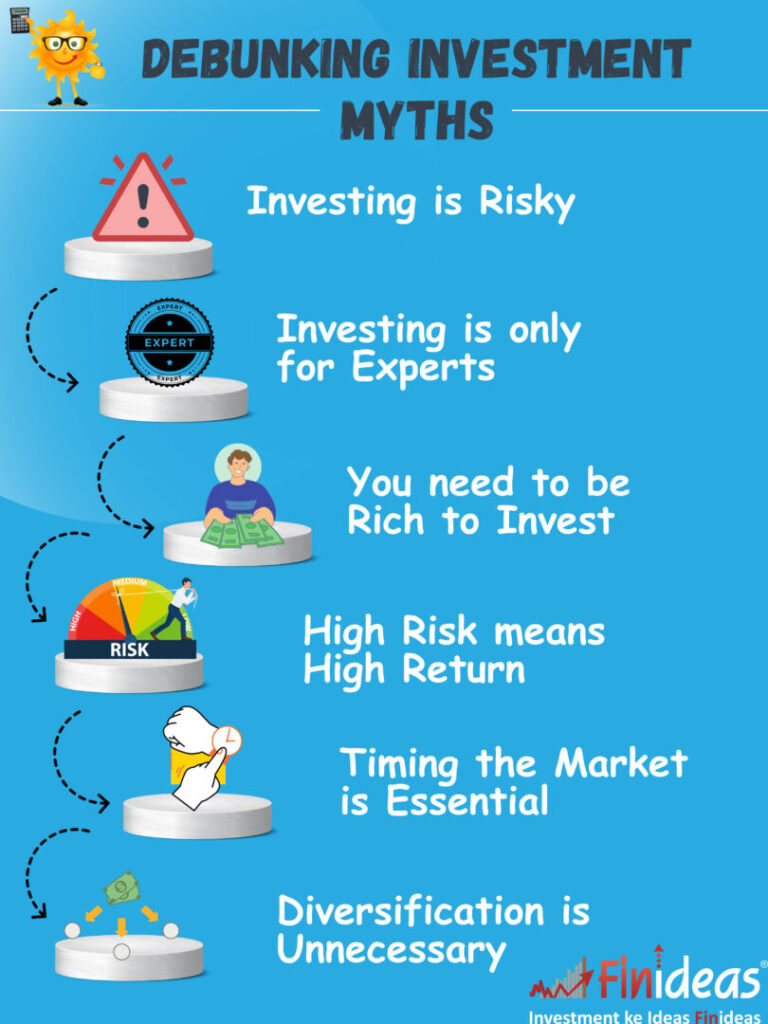Debunking Investment Myths: Your Path to Financial Success
Investing in the stock market can be an excellent way to build wealth, but it’s important to separate fact from fiction when navigating this financial landscape. Here are some of the most prevalent myths and misconceptions that often deter potential investors, along with the truth that can help you make more informed investment decisions.
Myth 1: Investing Is Risky
Investing is often perceived as risky, but this misconception overlooks a crucial aspect: education and research. Just as you wouldn’t dive into a swimming pool without learning how to swim, you shouldn’t invest without understanding the basics. Risk in investments often arises from not being aware of what you’re doing. Educate yourself, understand your risk appetite, and invest wisely to mitigate the associated risks. In the long run, investments can be less risky if you approach them with the right knowledge and discipline When You calculate & plan your investment then your risk becomes minimum which is used in Index Long Term Strategy.
Myth 2: Investing Is Only for Experts
Many believe that only financial experts can navigate the stock market successfully. While understanding the market and the stocks you invest in is essential, you don’t need to be an expert. Basic knowledge, research, and a long-term approach can be sufficient for many investors. Continuous learning and preparedness are the keys to success in the stock market.
Myth 3: You Need to Be Rich to Invest
Investing in the stock market doesn’t require you to be a millionaire. Unlike other investment options like real estate, the stock market allows you to start with a relatively small initial capital. The key is to start early, invest regularly, and let your money accumulate over time. With options like Systematic Investment Plans (SIP) and easy-to-access online platforms, you can begin with as little as you like.
Myth 4: High Risk Means High Returns
It’s a common misconception that high-risk investments always yield high returns. In reality, high-risk investments can result in substantial losses as well. Finding a high-risk investment with a guarantee of high returns is challenging. Instead, consider investing in quality companies with good management at a favorable price, minimizing your overall risk while still achieving profitable returns.
Myth 5: Timing the Market is Essential
Trying to time the market by buying low and selling high is a common myth, but it’s an approach fraught with challenges. Successfully predicting stock price bottoms and tops is nearly impossible. What matters more is buying stocks at the right time for your investment goals and holding them for the long term.
Myth 6: Diversification Is Unnecessary
Some investors prefer concentrated portfolios, thinking it’s the best way to make significant profits. However, this approach can be high-risk. Diversification, spreading your investments across various assets and industries, can help manage risk and provide stability to your portfolio. It’s a smart strategy to protect your investments from potential downturns.
What is the biggest misconception or myth about investing that you’ve personally encountered, and how did you overcome or address it in your investment approach? Comment Down Below
Conclusion
Investing in the stock market doesn’t have to be as daunting as it may seem. By dispelling these common myths and misconceptions, you can approach your investment journey with more confidence and a better understanding of how to navigate the market. Remember that education, discipline, and a long-term perspective are key to successful investing, regardless of your financial expertise or initial capital. Start early, invest wisely, and stay informed to make the most of the wealth-building opportunities the stock market offers. Don’t let these myths hold you back from your financial goals.
Happy Investing!
This article is for education purpose only. Kindly consult with your financial advisor before doing any kind of investment.


